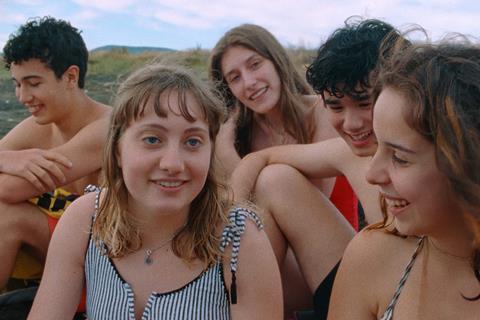A trio of Italian filmmakers ask the next generation what might lie ahead for their country and themselves

Dirs/scrs: Pietro Marcello, Francesco Munzi, Alice Rohrwacher. Italy. 2021. 108 mins.
Quo Vadis, Italia? Focusing on the hopes and fears of the next generation, Futura captures a snapshot of what might lie ahead for Italy. A straightforward work of “collective reportage” from directors Pietro Marcello, Francesco Munzi and Alice Rohrwacher, the film grows more interesting as it starts to unravel the contradictions in teenagers torn between a nostalgia for the past and a sense of foreboding about the future. A healthy festival run seems guaranteed for a picture in the tradition of Michael Apted’s 7 Up series.
It is disheartening to discover a generation seemingly so conformist
Futura unfolds with a minimum of context or commentary. We only know that Marcello, Munzi and Rohrwacher met in 2020 and travelled throughout their “beautiful country” talking to young people about how they imagined the future. Locations range across rural villages, suburbs and cities from Naples to Milan, Turin to Palermo, Venice, Rome and beyond. Along the way the trio interview boxers, aspiring beauticians, drama students, farmers, students and musicians. Shot on 16mm, Futura lingers on animated faces, capturing conversations that are often stilted and self-conscious but take flight when questions provoke a reaction. “Do you feel as free as your parents?” “What is the future for you?“ “What would you do if you were head of state?” are among the enquiries.
Notable aspects of the responses lie in the modesty of ambition displayed and the desire for the comforting and conventional. There is a surprising docility and conservatism among those interviewed. One of the aspiring beauticians confidently expresses her dream for a family, a man she can love and children. She adds that ”men must provide for the family.” Ambitions are constantly framed in terms of marriage, work and family. There is also a tendency to belittle Italy, claiming that it has little to offer their generation of teenagers. “There is no future in Italy,“ claims one. Another boy declares that “the most patriotic thing you can do is send your child abroad to study.” One member of a Romani family adds, “Young people today are good for nothing.”
The directorial trio never fully explore the sense of disillusionment or apathy among these teenagers. You wonder, where is the fire and passion? The hunger to change the world, tear apart the past and engineer change?
There is sparing use of black-and-white archive footage to provide a contrast with similar television investigations from the 1960s and 1970s, directed by Mario Soldati and Luigi Comencini. A reporter asks a group of boys if they have books at home and if they could recite a poem. The ready answers include an enthusiasm for Homer and a recitation of a poem by Giosue Carducci. Did culture play a bigger part in the nation 60 years ago?
The pandemic strikes during filming and lends a sharper focus to the anxieties of those who start to consider themselves a lost generation. In Genoa, few of the young people know about the events of 2001, when the G8 summit was met by mass anti-globalisation protests and police violence. It seems they would be less confrontational today. “You should never cross the line,” advises one.
It is disheartening to discover a generation seemingly so conformist. There is a measure of reassurance in their hope for a society that might be more tolerant, more inclusive and less splintered by inequality. The future might not burn brightly for these Italian youngsters, but it could be kinder and gentler.
Production companies: Avventurosa, RAI Cinema
International sales: The Match Factory, info@matchfatory.de
Executive producer: Alessio Lazzareschi
Cinematograpy: Ilya Sapetia
Editing: Aline Herve
Music: Marco Messina, Sacha Ricci
























